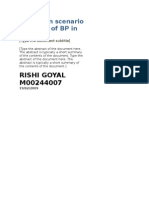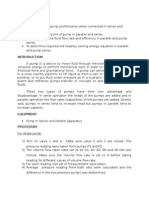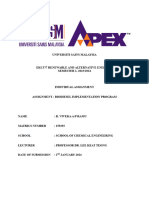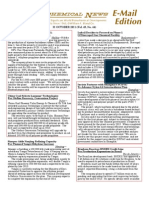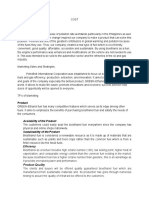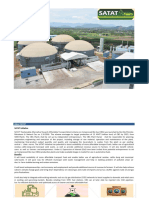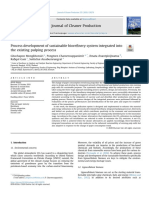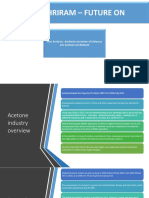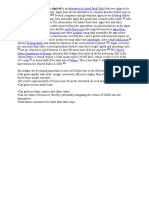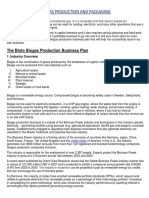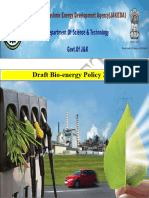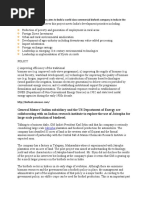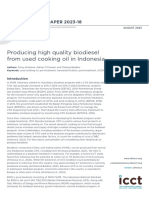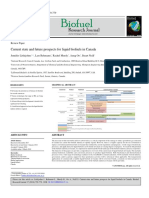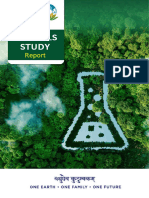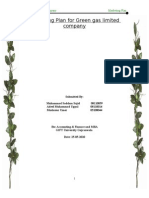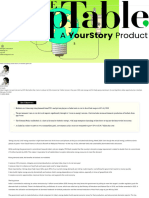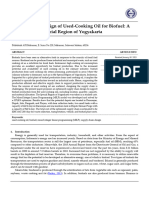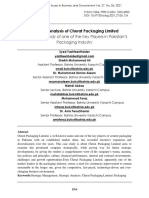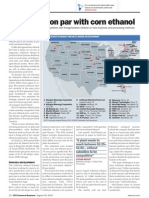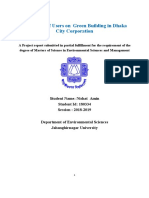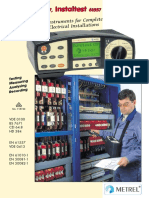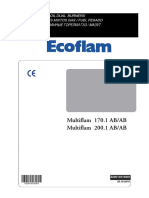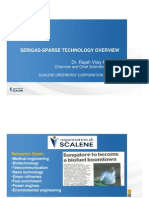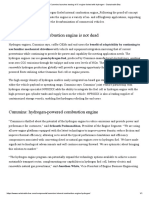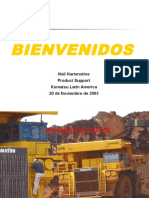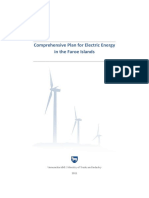Mitsubishi Chemical Interview
Mitsubishi Chemical Interview
Uploaded by
Doris de GuzmanCopyright:
Available Formats
Mitsubishi Chemical Interview
Mitsubishi Chemical Interview
Uploaded by
Doris de GuzmanOriginal Title
Copyright
Available Formats
Share this document
Did you find this document useful?
Is this content inappropriate?
Copyright:
Available Formats
Mitsubishi Chemical Interview
Mitsubishi Chemical Interview
Uploaded by
Doris de GuzmanCopyright:
Available Formats
NEWS FOCUS
For a round-up of our latest online news, feature and multi-media content visit icis.com/news
RENEWABLES DORIS DE GUZMAN NEW YORK
MCC invests in renewables
Mitsubishi Chemical expands its portfolio of bio-based chemicals through partnerships
Japan-based Mitsubishi Chemical Corp. (MCC) is expanding its product portfolio and feedstock sources with renewable-based options through partnerships and joint ventures this year. In late April, MCC formed a 50:50 joint venture (JV) called PTT MCC Biochem Company (PMBC) with Thailand-based industrial conglomerate PTT to develop and produce sugar-derived polybutylene succinate, a biodegradable aliphatic polyester with similar properties to polyethylene (PE). Major applications for polybutylene succinate are mulch lms, packaging lms, bags and ushable hygiene products. MCC produces and markets polybutylene succinate in its 3,000 tonne/year Japan plant under the trademark GS Pla using petroleumderived succinic acid and butanediol (BDO) as feedstock. The JV not only aims to establish and develop a polybutylene succinate market worldwide, but also to build a polybutylene succinate production chain using renewable based succinic acid and BDO, said Shigeru Handa, general manager of the Sustainable Resources Business Development department at MCCs petrochemicals R&D division. An industry source estimates the current polybutylene succinate and derivatives market at 100,000120,000 tonnes/year. Modied polybutylene succinate polymers such as those being blended with polylactic acid (PLA) or starch are now available in the market. oresins are used for optical/transparent applications. We were looking for alternative monomer to PC mostly to obtain a different property than that of the existing PC. What we found was an improved property of PC which happens to be biodegradable at the same time, said Handa. MCC also has plans to replace some of its basic raw materials such as C3 and C4 with renewable-based alternatives. In this case, we will be able to drop in the bio-based basic chemicals into our existing derivatives production processes, said Handa. We are also seeking possibilities of producing downstream chemicals straight from sugar. He cited as an example MCCs partnership with Genomatica to establish the rst bio-BDO plant in Asia. The main driver for going the biobased route is to reduce costs, noted Handa. There is a practical need for bio-based chemicals, especially in Japan, which is importing most of its petroleum-based raw materials, said Handa. Considering that oil producing countries are now intensively entering the Asian market and that oil price is stuck at a high level, we think that having an alternative source is necessary and that biobased chemicals would provide an opportunity to maintain growth. MCC parent company Mitsubishi Chemical Holding Corp (MCHC) positioned sustainable resources as one of its six core future businesses under a ve-year midterm management plan announced in December 2010. Under the plan, MCHC also started implementing a concept called KAITEKI, which identies sustainability, health and comfort as the decision criteria of its corporate activities.
Follow bio-based projects at ICIS plants and projects. www. icis.com/plants-and-projects
PTT MCC Biochem joint venture launched this year in Thailand biomass materials, we believe there is a huge potential for biobased chemicals and bioplastics in Asia, and we would like to explore every opportunity here. PMBC formed a supply partnership in April with US companies BioAmber for biobased succinic acid production in Rayong, and Genomyet as cost-competitive as petroleum-based succinic acid because of current production of scale, Handa said. We believe that with the improvements in combined technology of BioAmber and MCC, the growth of biosuccinic acid will provide a scale large enough to be more competitive than petro-based products. MCC did not disclose PMBCs expected consumption for bioBDO, nor a timeline for when Genomatica will start producing bio-BDO for its use. When it comes to bio-BDO, Genomatica has its own plans for the foreseeable future but we prefer to have a facility in Asia, said Handa.
There is a practical need for bio-based chemicals, especially in Japan
SHIGERU HANDA General manager, Sustainable Resources Business Development, MCC
BIO-BASED CHEMS WANTED PMBC will build a 20,000 tonne/ year bio-polybutylene succinate plant in Rayong, Thailand, which is expected to start in 2015. We see increasing demand for GS Pla, and we are even thinking that maybe the 20,000 tonne capacity will be too small, said Handa. Considering Asias rich
atica for bio-based BDO production. MCCs main interest in biosuccinic acid is its competitiveness as a raw material for its polybutylene succinate business, said Handa. The bio-polybutylene succinate plant will use 15,000 tonnes/year of biosuccinic acid starting in 2015. The UKs National Centre for Biorenewable Energy, Fuels and Materials estimates current global biosuccinic acid production at 16,00030,000 tonnes/year. Succinic acid pricing is estimated at $2,0003,000/tonne. Biosuccinic acid today is not
IN THE BIO PIPELINE Aside from GS Pla, MCCs current bio-based lineup includes an engineering plastic trademarked DURABIO made from sugarbased isosorbide monomers. MCC produces DURABIO at a 300 tonne/year pilot plant in Kurosaki and plans to scale up to commercial quantities in a couple of years at a plant that will also be located in Japan, said Handa. He said DURABIO possesses the better transparency of polycarbonate (PC) and the better impact resistance of polymethyl methacrylate (PMMA). France-based starch derivatives company Roquette supplies the isosorbide feedstock. MCC offered two grades of DURABIO in the rst quarter this year for customer testing. The bi-
10 | ICIS Chemical Business | August 29-September 4, 2011
www.icis.com
You might also like
- INDIA's First BIO CNG PLANT PDFDocument3 pagesINDIA's First BIO CNG PLANT PDFMarcus Nguyễn100% (1)
- BP Scenario PlanningDocument6 pagesBP Scenario Planningrishi goyalNo ratings yet
- Business PlanDocument38 pagesBusiness Planamansinghaniaiipm83% (6)
- CBF BioMaterials Pre-IssueDocument43 pagesCBF BioMaterials Pre-IssueDoris de GuzmanNo ratings yet
- Fluid Lab - Pump in Parallel and SeriesDocument8 pagesFluid Lab - Pump in Parallel and SeriesYukiYukina100% (2)
- New Glycerine UseDocument2 pagesNew Glycerine UseDoris de GuzmanNo ratings yet
- Entering The Carbon MarketDocument7 pagesEntering The Carbon MarketajeehaniaziNo ratings yet
- Ekc377:2 Assignment 1Document16 pagesEkc377:2 Assignment 1Viveka RamuNo ratings yet
- Annual Report 2012 EngDocument2 pagesAnnual Report 2012 EngIndra Chandra SetiawanNo ratings yet
- Succinic AcidDocument2 pagesSuccinic AcidSamhitha UdupaNo ratings yet
- Petroleum Minister To Launch SATAT Initiative To Promote Compressed Bio-Gas As An Alternative, Green Transport FuelDocument2 pagesPetroleum Minister To Launch SATAT Initiative To Promote Compressed Bio-Gas As An Alternative, Green Transport FuelAnkush IkadeNo ratings yet
- V49N044Document4 pagesV49N044Nitin RawatNo ratings yet
- Ananzoo BioCNG Analysis ReportDocument21 pagesAnanzoo BioCNG Analysis Reportb.yadavNo ratings yet
- Biomass Strategy2013Document20 pagesBiomass Strategy2013Daniel TanNo ratings yet
- Cost Summary PurcommDocument6 pagesCost Summary PurcommAhrvin Josh HortalNo ratings yet
- Precipitated Calcium Carbonate: Use of PCC in Following IndustryDocument5 pagesPrecipitated Calcium Carbonate: Use of PCC in Following IndustrydipNo ratings yet
- BIOGAS PresenatationDocument5 pagesBIOGAS Presenatations.basuNo ratings yet
- Biogas - A Possible Solution For India's Energy Secirity and Decarbonisation Goals - Oct23 - 0Document23 pagesBiogas - A Possible Solution For India's Energy Secirity and Decarbonisation Goals - Oct23 - 0gauravmukhisjsNo ratings yet
- Development Prospects of Indonesia's Biodiesel Industry 2022Document9 pagesDevelopment Prospects of Indonesia's Biodiesel Industry 2022Daniel NjooNo ratings yet
- BIO Advancing The Biobased Economy 2016Document84 pagesBIO Advancing The Biobased Economy 2016unicornmfkNo ratings yet
- Business Plan (Final Draft)Document17 pagesBusiness Plan (Final Draft)muneem.hasaniNo ratings yet
- Polyols Project: Mumbai Refinery - Plans For The FutureDocument3 pagesPolyols Project: Mumbai Refinery - Plans For The FuturePRANUNo ratings yet
- Daily Sales TechniquesDocument14 pagesDaily Sales Techniquesharnek singhNo ratings yet
- BioplasticsDocument15 pagesBioplasticspreshanthanNo ratings yet
- BBB Summit-2023 PDFDocument8 pagesBBB Summit-2023 PDFNET ZERO SUMMITSNo ratings yet
- Natural Fi Bres Aim To CompeteDocument8 pagesNatural Fi Bres Aim To CompeteSudhir PawarNo ratings yet
- DCM ShriramDocument7 pagesDCM ShriramSiddarthSaxenaNo ratings yet
- 1 s2.0 S095965261831360X MainDocument14 pages1 s2.0 S095965261831360X MainSiti Sarah IbrahimNo ratings yet
- Accountant TPIA Analysis Muhammad Reza HandyansyahDocument4 pagesAccountant TPIA Analysis Muhammad Reza HandyansyahMuhammad Reza HandyansyahNo ratings yet
- Algae Fuel, Algal Biofuel, or Algal Oil Is An: Alternative To Liquid Fossil Fuels AlgaeDocument5 pagesAlgae Fuel, Algal Biofuel, or Algal Oil Is An: Alternative To Liquid Fossil Fuels AlgaeBhagirath GogikarNo ratings yet
- Bioto Business PlanDocument10 pagesBioto Business PlanMuhangi ChristopherNo ratings yet
- Draft Bioenergy Policy 2022Document19 pagesDraft Bioenergy Policy 2022Jeeva SharmaNo ratings yet
- Biofuel IndiaDocument3 pagesBiofuel IndiaPoonam ThoolNo ratings yet
- Biodiesel PresentationDocument30 pagesBiodiesel PresentationShAmI NawazNo ratings yet
- Help Us To Grow & Provide Quality Service: Suggestions & Feedback Are WelcomedDocument22 pagesHelp Us To Grow & Provide Quality Service: Suggestions & Feedback Are WelcomedNija RajuNo ratings yet
- Project Content NewDocument81 pagesProject Content NewSintoj ThomasNo ratings yet
- UCO Indonesia Working Paper 18 A4 ENGLISH FIRST PROOFDocument15 pagesUCO Indonesia Working Paper 18 A4 ENGLISH FIRST PROOFDr Mahmoud MesbahNo ratings yet
- BRJ Volume 5 Issue 1 Pages 759-779Document21 pagesBRJ Volume 5 Issue 1 Pages 759-779Raju GummaNo ratings yet
- Biodiesel Thesis PDFDocument7 pagesBiodiesel Thesis PDFkarenoliverbaltimore100% (2)
- Biorefining-Business PlanDocument18 pagesBiorefining-Business PlanNida FarrukhNo ratings yet
- BPCLDocument66 pagesBPCLluthra0996No ratings yet
- Renewable Natural Gas Technology (Rengas) : Sustainable SolutionDocument4 pagesRenewable Natural Gas Technology (Rengas) : Sustainable Solutionsj singhNo ratings yet
- Edition 25Document44 pagesEdition 25fatimarpri18No ratings yet
- SKI Green Financing Framework - Apr2022 VFFDocument10 pagesSKI Green Financing Framework - Apr2022 VFFyahy2No ratings yet
- 2010 - 02 Biofuels 2020 PDFDocument12 pages2010 - 02 Biofuels 2020 PDFteriaxNo ratings yet
- Polylactic Acid (PLA) Production-64832 PDFDocument63 pagesPolylactic Acid (PLA) Production-64832 PDFzackNo ratings yet
- Tagliani - 2024 - Bioeconomy PolBrief - Published VersionDocument11 pagesTagliani - 2024 - Bioeconomy PolBrief - Published Version8361215No ratings yet
- Business Plan BiodieselDocument8 pagesBusiness Plan BiodieselManas KelaskarNo ratings yet
- Chemicals Sector - FICCIDocument48 pagesChemicals Sector - FICCIP VinayakamNo ratings yet
- Becoming Carbon Neutral by 2020 at The UN Climate Change Conference COP21Document2 pagesBecoming Carbon Neutral by 2020 at The UN Climate Change Conference COP21VIshakNo ratings yet
- UntitledDocument2 pagesUntitledMoustapha BasseNo ratings yet
- Biodiesel PHD Thesis PDFDocument6 pagesBiodiesel PHD Thesis PDFphewzeajd100% (2)
- Biofuel StudyDocument45 pagesBiofuel Studypvinayakam2015No ratings yet
- Biorefinery For The Production of Biodiesel, Hydrogen and Synthesis Gas Integrated With CHP From Oil Palm in MalaysiaDocument10 pagesBiorefinery For The Production of Biodiesel, Hydrogen and Synthesis Gas Integrated With CHP From Oil Palm in MalaysiaSERGIO PEREZNo ratings yet
- Launching of Bio Gas in GujranwalaDocument24 pagesLaunching of Bio Gas in GujranwalaZaukNo ratings yet
- India Is Knocking at The Doors of A Biofuel Gold RushDocument6 pagesIndia Is Knocking at The Doors of A Biofuel Gold RushHey JudeNo ratings yet
- Supply Chain Design of Used-Cooking Oil For Biofuel: A Case Study in Special Region of YogyakartaDocument12 pagesSupply Chain Design of Used-Cooking Oil For Biofuel: A Case Study in Special Region of YogyakartaNga TạNo ratings yet
- Business Plan F.projectDocument24 pagesBusiness Plan F.projectzetseatNo ratings yet
- 20121123003140!business Plan For Website2Document24 pages20121123003140!business Plan For Website2Harshith GowdaNo ratings yet
- CIBG - Volume 27 - Issue 6 - Pages 1556-1568Document13 pagesCIBG - Volume 27 - Issue 6 - Pages 1556-1568syedaNo ratings yet
- Road Map Update for Carbon Capture, Utilization, and Storage Demonstration and Deployment in the People’s Republic of ChinaFrom EverandRoad Map Update for Carbon Capture, Utilization, and Storage Demonstration and Deployment in the People’s Republic of ChinaNo ratings yet
- Roquette Green Chemistry Symposium AgendaDocument2 pagesRoquette Green Chemistry Symposium AgendaDoris de GuzmanNo ratings yet
- 21st Century Snake Oil - Why The U.S. Should Reject Biofuels As Part of A Rational National Security Energy StrategyDocument86 pages21st Century Snake Oil - Why The U.S. Should Reject Biofuels As Part of A Rational National Security Energy StrategyetiscribdNo ratings yet
- Nordic Wood Biorefinery Conference 2012Document436 pagesNordic Wood Biorefinery Conference 2012Doris de GuzmanNo ratings yet
- Bio-Based PolyurethaneDocument2 pagesBio-Based PolyurethaneDoris de GuzmanNo ratings yet
- Oleochemicals 2011Document3 pagesOleochemicals 2011Doris de GuzmanNo ratings yet
- Cellulosic Ethanol 2010Document2 pagesCellulosic Ethanol 2010Doris de GuzmanNo ratings yet
- Perception of Users On Green Building in Dhaka City CorporationDocument54 pagesPerception of Users On Green Building in Dhaka City CorporationNishat Amin Moni100% (1)
- C21PE - Lecture 4 - Energy Policy 2018Document39 pagesC21PE - Lecture 4 - Energy Policy 2018Tasnim MuradNo ratings yet
- Single 2002 MI 2086 MI 2087 Test Ang PDFDocument6 pagesSingle 2002 MI 2086 MI 2087 Test Ang PDFsupremeelectricianNo ratings yet
- Compressor Settle Out Pressure and Compressor Lube SystemDocument34 pagesCompressor Settle Out Pressure and Compressor Lube SystemMustafa AhsanNo ratings yet
- Orange Pulp Drying ProjectDocument6 pagesOrange Pulp Drying ProjectHARKULVINDER SINGHNo ratings yet
- Multiflam 170.1-200.1 Ab - Ab PDFDocument54 pagesMultiflam 170.1-200.1 Ab - Ab PDFMa VioNo ratings yet
- Seminar ON Solar Photovoltaic:Basic & ApplicationDocument24 pagesSeminar ON Solar Photovoltaic:Basic & ApplicationJitendraKumarNo ratings yet
- To by Meyer Solar OnixDocument26 pagesTo by Meyer Solar OnixA AhmedNo ratings yet
- SGCL Technology OverviewDocument25 pagesSGCL Technology OverviewRajahVKNo ratings yet
- FossilfuelsDocument6 pagesFossilfuelsapi-438357435No ratings yet
- Cummins Launches Testing of IC Engine Fueled With Hydrogen - Sustainable BusDocument1 pageCummins Launches Testing of IC Engine Fueled With Hydrogen - Sustainable BusAbraham ikiyorumNo ratings yet
- S 1470Document2 pagesS 1470Thirukandiyur Sudarsana Sri RamanNo ratings yet
- Dasu HPPDocument29 pagesDasu HPPRaza312No ratings yet
- SUBMERSIBLE PUMP SelectionDocument6 pagesSUBMERSIBLE PUMP SelectionSyed Muztuza AliNo ratings yet
- Morocco Qeg June 2014 Test and Measurement Report v2 011Document30 pagesMorocco Qeg June 2014 Test and Measurement Report v2 011Brandon GarlandNo ratings yet
- Electrical DC PresentationDocument17 pagesElectrical DC Presentationwviv5244No ratings yet
- Today's Special: Green BuildingsDocument47 pagesToday's Special: Green BuildingsAmrutha ChutkayNo ratings yet
- 4991 Checklist 1905451Document4 pages4991 Checklist 1905451alaae5917No ratings yet
- 300MW Sakaka Solar PV Project AwardedDocument2 pages300MW Sakaka Solar PV Project Awardedfahad sameerNo ratings yet
- ECE 4310 Final Exam 2014Document3 pagesECE 4310 Final Exam 2014spoonej.17No ratings yet
- Power Management GuideDocument101 pagesPower Management GuideDiego MenegazziNo ratings yet
- TM 9-1750F Power Unit For Medium Tanks M3A4 and M4A4 1943Document309 pagesTM 9-1750F Power Unit For Medium Tanks M3A4 and M4A4 1943beppefranz100% (1)
- Presentation Luxtium 2020-01-17 PDFDocument26 pagesPresentation Luxtium 2020-01-17 PDFYesui Ujin BoldbayrNo ratings yet
- Iso 1940 - 1Document11 pagesIso 1940 - 1Kaushik Sengupta100% (2)
- Walbro Carburetor Theory 27jun2010Document13 pagesWalbro Carburetor Theory 27jun2010rajdrkl100% (1)
- Test Paper 3rdq ScienceDocument3 pagesTest Paper 3rdq Scienceloven trasmonteNo ratings yet
- Presentation-3 - Exp - Flex Options - Tech WS - 181114 - V4Document65 pagesPresentation-3 - Exp - Flex Options - Tech WS - 181114 - V4Juniko ParhusipNo ratings yet
- Comprehensive Plan For Electric Energy in The Faroe IslandsDocument39 pagesComprehensive Plan For Electric Energy in The Faroe Islands12345zolyNo ratings yet
- Experience in Motion: Overhung Between BearingsDocument1 pageExperience in Motion: Overhung Between BearingsJustyna SzymborskaNo ratings yet

